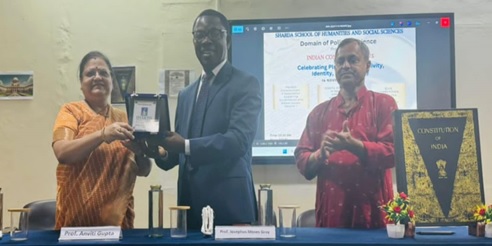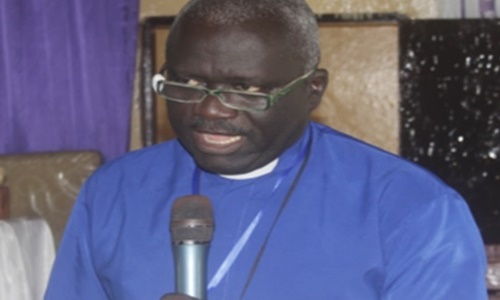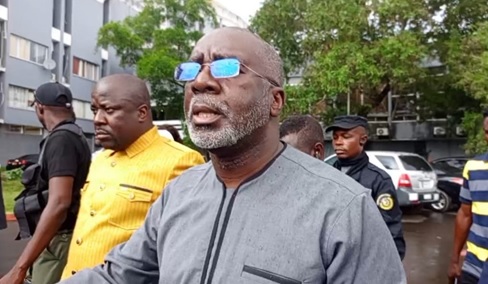New Delhi, India, 14 November 2024 – I’m excited to be in here, and grateful for the opportunity given me to share my thoughts and experience with the esteemed professors, faculty, students and staffs of this great institution of learning, Sharda University. Let me recognize the presence of Professor Dr. Anviti Gupta, illustrious Dean of Sharda School of Humanities and Social Sciences and everyone who continue to make me to feel comfortable and at home, in India which I consider my third home after France which is my second home and Liberia my birth home. So I am pleased to be home again.
I graciously accepted the invitation because I felt that such an occasion should always be cherished. This is a cause that is so dear to my heart. I’ve been looking forward to this exceptional event. Thank you for this important occasion and for your confidence in me as Keynote Speaker. In my recent conversation with Dr. Ashok Daryani, President of International Relations of Sharda University, I shared how deeply humbled I am to be accorded the opportunity to join your esteemed faculty as a visiting professor at Sharda University in India for two months, October 24-November 22, 2024.
Our presence at Sharda University, especially the Sharda School of Humanities and Social Sciences, gives hope and deepens the MoU between our two institutions of learning–the University of Liberia and Sharda University. Beyond that, it brightens the unique relationship between India and Liberia as we look ahead to brighter days.
I’m truly honored to earn your trust and admiration to serve as a visiting professor in the Department of Political Science and the students of the class are among the best and smartest people that I have taught in my professional career. I am therefore humbled by the opportunity to share some of my thoughts and convictions regarding the theme of today’s forum: Constitution After 75 Years of Independence:
Kindly allow me to share some historical facts of Liberia-India relations. Our two countries, Liberia and India, are bound together by something common….the magic number of “47”. India gained Independence 1947 while Liberia declare independence 1847. We are the countries of 47.
Our relationship goes beyond five decades; it started in the 70s, when the former Foreign Minister of India, Mr. Sardar Swaran Singh visited Liberia in 1971.
The relationship between our two countries has been warm and friendly. Liberia has supported India’s candidature at various United Nations (UN) fora, including reaffirming Liberia’s support to India’s candidature for a permanent seat in the expanded UN Security Council.
During the heat of the Liberian Civil War, India contributed to UN Peacekeeping Force to Liberia from 2007-2017 and succeeded to bring peace to our country.
Beyond peacekeeping, India is significantly contributing to Liberia’s economy through cooperation and trade with the current bilateral trade at US$283.95 M. India’s gift of 25 buses in 2010 has been a visible example of India’s assistance to improve daily lives of thousands of Liberians.
Today, there are about 3000 Indian nationals in Liberia, while Liberian students attending in India are about 2,000. India hosts the highest number of Liberian students overseas with the higher number of these students in Sharda University due to the MoU between University of Liberia and Sharda University.
Kindly allow me to turn to the subject for which we are here today: “Constitution after 75 Years of Independence”. Our presence here today bears a very great responsibility because we are representing our beloved countries, our histories, the ideals and determination of our beloved and great institutions: The University of Liberia and the Sharda University.
As you are aware, serious attention is being placed on Constitution in the context of democratic governance, free speech and freedom of the press, freedom of movement, democracy and civil liberties in India; it is the same way in Liberia.
A constitution is the foundation for governance in almost all societies/countries around the world. India attained its independence on Aug. 15, 1947, but it only became a fully sovereign republic with its own head of state on Jan. 26, 1950. Despite its long and generally promising history, Indian constitutional democracy has faced turbulent times. Similarly, Liberian democracy has experienced numerous interruptions, mainly due to internal and external political elements.
When they began drafting India’s constitution 75 years ago, the 299 framers intended to create a charter that would serve all Indians, no matter their faith, class or gender. The 299 men and women of India’s Constituent Assembly worked to imagine their emerging country and to inscribe their vision and foundational legal principles in a national constitution.
The outcome of their efforts is a remarkable document that remains a source of inspiration. However, whether that democratic tradition continues for another 75 years will depend on lawmakers and judges staying true to that vision of the framers.
Since its independence from British colonial rule India has had its share of instability and national upheaval: a complex process, including Partition: the division of India into Muslim-majority Pakistan and Hindu-majority India. Partition displaced tens of millions of people and caused loss of life and property that remains in living memory for many.
Analyzing and studying constitutions of different countries may allow one to understand better how various countries form the basic structures of their governments, the legal and cultural aspects of their people, the responsibilities of key institutions, and the most basic rights of the people. Perhaps appropriately, the world’s most-populous democracy has the world’s longest national constitution. At the time it was adopted in 1949, the Indian Constitution contained 395 Articles and had approximately 145,000 words.
By comparison, Monaco has the world’s shortest constitution, it has just around 3,800 words. Liberia has adopted two Constitutions since its independence in 1847, the 1847 constitution and the 1986 constitution. Constitutions around the world were not as common as they are today. Comparatively, India’s constitution was just the world’s 23rd national constitution.
Consequently, ratification was itself a major achievement. In societies like India with many deep cultural, religious and socioeconomic divides, the process of drafting and ratifying a shared founding document served a valuable symbolic function. Some countries are faced with challenges of drafting their constitutions for deeply heterogeneous population; they never agree on a single, unifying document.
India’s 1947 constitution did not contain a “due process” clause like its American counterpart: U.S. Supreme Court Justice Felix Frankfurter had warned Rau that due process would give Indian courts too much power to overrule legislation, while simultaneously imposing a heavy burden on the judiciary.
India’s constitution does, however, contain non-justiciable “Directive Principles.” The term non-justiciable means these constitutional provisions cannot be enforced by courts. This feature was borrowed from the Irish Constitution of 1937 to give lawmakers and judges a set of values to keep in mind.
Today, India’s Constitution is among the most amended in the world. It has 105 amendments, the latest one passed in August 2021. Easy change was intentionally encoded into the Indian Constitution. “[T]here is no permanence in Constitutions,” declared India’s first Prime Minister, Jawaharlal Nehru. “There should be a certain flexibility.”
Consequently, Article 368 only requires that a sole member of parliament propose a bill to change the constitution and that parliament approve proposed changes by a simple majority to pass them. By contrast, the U.S. Constitution requires two-thirds of Congress to propose a constitutional amendment or two-thirds of the states to propose a constitutional convention to consider amendments.
Ratification requires two-thirds of the states. Consequently, only 27 of roughly 12,000 amendments to the Constitution proposed since 1787 have been adopted. Easy change is credited with being one contributor to the Indian Constitution’s longevity, which at 75 years old far exceeds the global average lifespan of 17 years.
In Asia, only two other countries that gained independence soon after World War II still have their original constitutions: Taiwan and South Korea. Thailand, by contrast, has had around 20 constitutions since 1932.
The Indian Constitution has several other elements that are remarkable – for better and for worse. Two provisions have received widespread acclaim. Article 17 responded to widespread and devastating caste discrimination by abolishing untouchability – the practice of segregating and persecuting certain groups because they are considered “impure” – “in any form.”
And Article 21, protecting life and personal liberty, has directly contributed to Indians’ right to a free, public elementary education and was cited in the Indian Supreme Court’s 2018 decision to decriminalize consensual, same-sex conduct.
Finally, some features of the Indian Constitution are unusual, but not necessarily good or bad. India’s Constituent Assembly’s Drafting Committee sought inspiration wherever it could. The Committee Chairman, B.R. Ambedkar, drew on his education in the United .States of America and United Kingdom. Advisor B.N. Rau traveled in the fall of 1947 to Canada, the U.S., Ireland and the U.K. to learn from their experiences.
Justice Rau even indicated which country had inspired each element of the draft constitution he prepared for the Assembly. The constitution has two provisions on religious freedom. Article 25 establishes “the right to freely profess, practise and propagate religion” to all persons. That is, the article grants individuals religious freedom.
More unusually, Article 26 recognizes “religious denomination[s]” as also having specific rights regarding property, institutional management and “matters of religion.” Liberia is recognized for practicing democratic governance as the pioneer and touch-bearer of democracy on the African continent evidence by the 1847 elections. Liberia is the first country in Africa to allow women to vote in a democratic election, while in 2005 Liberia made history to elect a woman’s as president.
Liberia, the first independence Republic in Africa, and Second black Independent Republic in the world, has strongly committed itself to promoting democratic governance on the continent. While the concept of democracy can be traced to the ancient Greeks and precisely the city-state of Athens in the fifth century B.C, democracy in Africa can also be traced to Liberia.
The First Elections that took place on the African Continent was held in Liberia, on 21 September 1847; Joseph Jenkins Roberts was elected as the first President upon Independence in 1847. Since then, Liberia has been judged by the world to be pioneer of democracy in Africa.
Two separate elections in Liberia have been recorded in the pages of history. In the 1927 Election, out of 15,000 registered voters, the incumbent Charles D. B. King garnered 243,000 votes against his opponent who received 9,000 valued votes. In the 1975 Election, President William R. Tolbert received 100% of the valid votes. Notwithstanding, the nation has undertaken several tangible interventions that have resulted in boosting national capacity and political will to avoid potential crises to multi-party democracy in the country.
For instance, Article 1 of the Liberian constitution provides that “All power is inherent in the people, while Article 3 states: Liberia is a unitary sovereign state. The article further states: The form of government is Republican with three separate coordinate branches: The Legislative, Executive and Judiciary, consistent with the principles of separation of powers and checks and balances.
Under our democratic governance system as it relates to the separation of powers and doctrine of check and balance, Legislative Power is implemented by the National Legislature as the legitimate representation of the people. The Legislature of Liberia consists of the Senate and the House of Representatives, both of which must pass on all legislations.
In the Liberian presidential system of government, the president functions as Head of State, Head of Government and at the same time as Commander-In-Chief of the Armed Forces of Liberia (AFL); the President is elected directly by the people every six years.
According to the Liberian constitution, the judicial power is vested in a Supreme Court and such subordinate courts. The Supreme Court comprises: One Chief Justice and four Associate Justices. Currently, the Supreme Court consists of two females and three males. The Judiciary is supposed to be independent.
Article 1 of the Liberian Constitution provides that: ‘All power belongs to the people and notes that they have the right to call for a constitutional referendum when their safety and happiness so require. Article (2) provides that: ‘This Constitution is the supreme and fundamental law of Liberia and its provisions shall have binding force. Liberia’s political history as regards democratic governance from the period of Independence to presence has experienced several difficulties resulting to several factors-both internal or external political maneuvering and arms twisting.
However, democratic governance and national development can be achieved by instituting the right policy at the right time by the right people at the right place through the right institutions.
As the Constitution provided for more opportunities across India, education became one of the pivotal pillars that the governments could rely on for the development agenda in their quest for national transformation.
To conclude, constitution is the foundation of all countries that protect rights and freedom, civil liberty and stability of the state.
Thank You!
Signed:
Assoc. Prof. Dr. Josephus M. Gray
Dean, Amos C. Sawyer College of Social Sciences and Humanities,
University of Liberia and Acting President, Grand Kru Technical College







